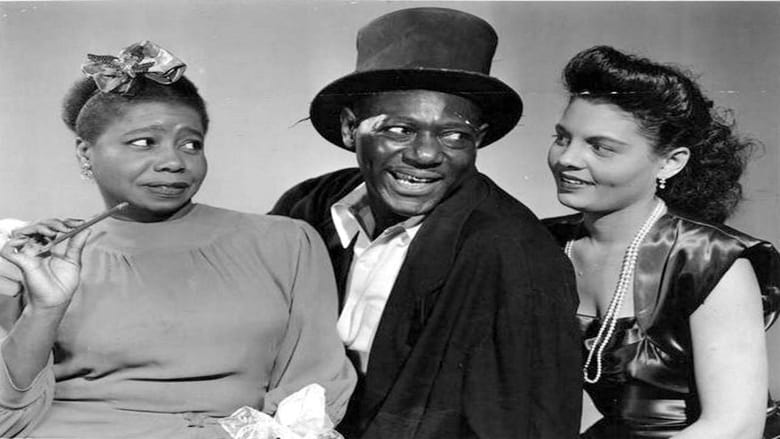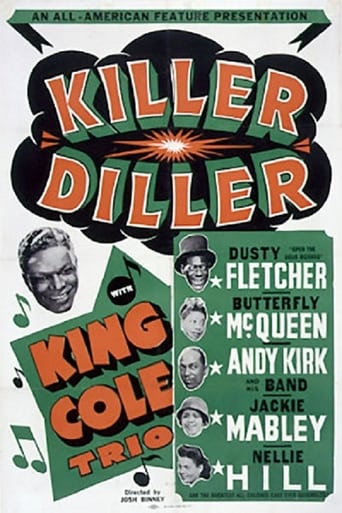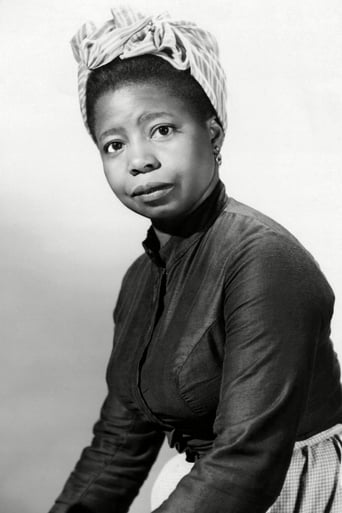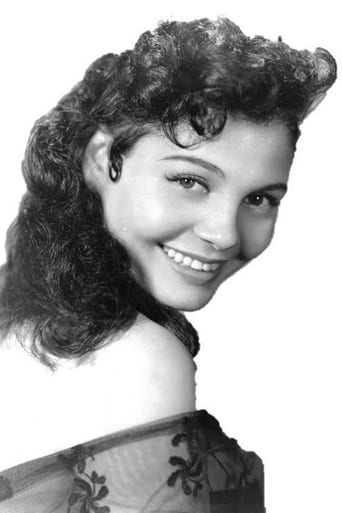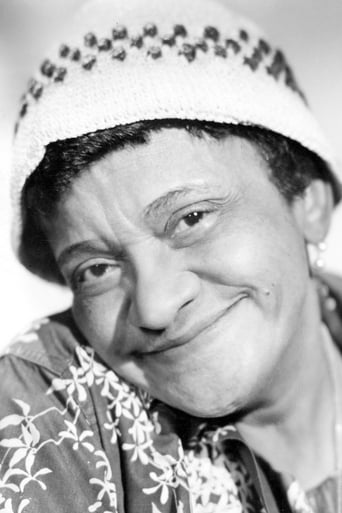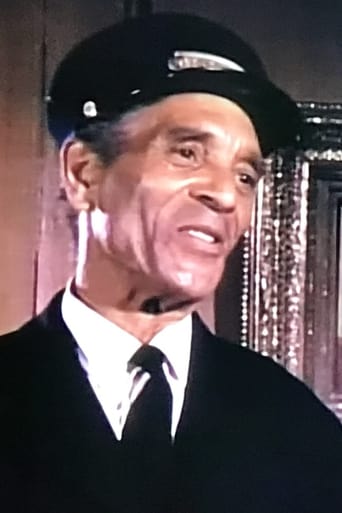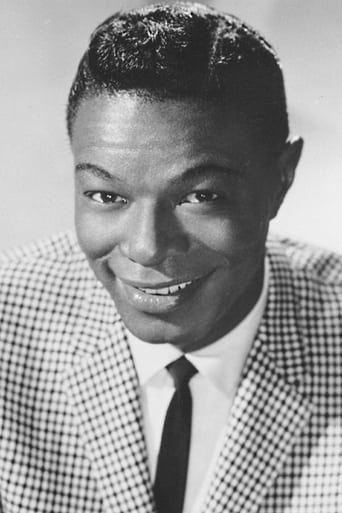An all-Black comedy and dance revue with stars of stage and screen.
Reviews
I love this movie so much
Please don't spend money on this.
If you don't like this, we can't be friends.
Fun premise, good actors, bad writing. This film seemed to have potential at the beginning but it quickly devolves into a trite action film. Ultimately it's very boring.
Fans of the Fats Waller musical tribute "Ain't Misbehavin'" will adore this all-black film set in a Harlem nightclub., featuring some of the best black entertainers of the 1940's. It's all about putting on a black musical revue, with a bit of a jewel heist caper thrown in for good measure. Everyone from Moms (Jackie) Mabley, Butterfly McQueen (being very much like Gracie Allen) to Nat King Cole and wonderful imitators of the Ink Spots get to perform. Mobley is funny in a sequence where, like the Keystone Cops ballet in "High Button Shoes", thinks the audience is laughing at her while a variety of cops appear behind her, coming out of a magic booth involved in humorous hijinks. The musical highlight is a performance of "Tain't Nobody's Business If I Do" and the unforgettable voice of Nat King Cole, here not singly billed, but appearing as part of the King Cole trio. The film's print is rather poor but the sound quality is satisfactory, making this a great record of what black audiences and the many other fans of that style of entertainment were enjoying "way uptown" in the golden age of Harlem entertainment.
Continuing to review movies featuring African-Americans in chronological order for Black History Month, we're now at 1948 with a revue presented on film by the All-American News company. What plot there is concerns Dusty "Open the Door, Richard" Fletcher being chased by some bumbling cops because of some ridiculous situation I don't feel like discussing here. The only funny parts of these segments were when one of those policemen said he knows where Dusty went because "I saw this picture before!" not to mention when another of them said "Let's do that again", the film went backward before the same running action ran as before. There was an amusing appearance by Jackie "Moms" Mabley on stage when discussing Old Mother Hubbard's gin or scatting to the song "Don't Sit on My Bed". Otherwise, it was mostly great musical acts like the Big Band-flavored Andy Kirk and His Orchestra, vocalist Beverly White, and The King Cole Trio with Nat himself playing great piano while singing "Ooh, Kickeroonie" and "Now He Tells Me" and then member Johnny Miller doing great bass on the instrumental "Breezy and the Bass". Also, Patterson and Jackson entertainingly impersonate The Ink Spots on "If I Didn't Care" before one of them does a tap dancing routine. Another duo of that sort are The Clark Brothers doing the kind of stuff The Nicholas Brothers had already done in several major shorts and features. And then there's the jitterbugging Four Congaroos which feature a couple of male-female pairs energetically doing what was the dance style of the day. Many of these acts, other than The King Cole Trio, aren't very well known today and appeared in few other films. The same could be said of many of the supporting actors though an exception would be Ken Renard, who plays the The Great Voodoo here, who subsequently appeared in many features and TV shows. In fact, I just watched him in the 1969 True Grit in which he was Yarnell Pointdexter, Mattie Ross's guardian during the hanging sequence when she was played by Kim Darby. Oh, and one more player here who had done many major features but would soon quit since she didn't like the stereotyping she endured was Butterfly McQueen who wasn't funny here. She would appear in Ms. Mabley's last film appearance of Amazing Grace in 1974. Okay, so on that note, I highly recommend Killer Diller if you're a curious enough film buff. P.S. Another player, Augustus Smith, was a native of Jacksonville, FL, which was where I once lived at from 1987-2003.
Killer Diller is one of the hundreds of films Hollywood churned out in the Thirties and Forties with minimal budgets, usually limited skills with the behind-the-camera personnel and with all-black casts. As soon as the pictures were in the can they were sent out to play in the movie equivalent of the old vaudeville chitlin' circuit...movie theaters in the South that played to segregated black audiences and movie theaters in the north that played to almost exclusively black audiences. The movies might have been second rate but the artists seldom were. Hollywood might now be incessantly patting its back about how liberal and open- minded it is toward black actors (we won't get into the situation with Latinos), but a generation ago just about the only opportunity for talented and skilled black entertainers were in these unofficially segregated movies. If we want a better understanding of Hollywood movie-making, we need to see some of these films. For many of the entertainers featured, these films are the only record we have of what they could do. On the one hand, these movies make a sad and discouraging story. On the other, what wonders these artists could perform. Killer Diller has the slightest of story lines, something about Mortimer Dumdone (George Wiltshire), the impresario of a theater who is presenting a variety show, somehow seeing his fiancé, Lola (Nellie Hill) disappear in a magic trick with a string of expensive pearls around her neck. A fake magician (Dusty "Open the Door, Richard" Fletcher), pretending to be Voodoo Man, is responsible. Dumdone's secretary, Butterfly McQueen, calls in the cops, who turn out to be a quartet of bumbling, falling, sprawling incompetents. Now forget all that. The point of the movie is the variety show, and it's a lot of fun. Basically, the director set up his camera facing the stage and then took a long lunch break. Let's see...there's Andy Kirk and His Orchestra doing some great, driving swing numbers featuring jazz saxophones...vocalist Beverley White, a cross between Pearl Bailey and Ethel Waters, singing..."I don't want to get married / for when you're single you have so much fun.I don't want to get married / 'cause two don't live as happily as one. Now I might want to stay out late some times all the way next dayAnd I don't want to be worried about what my husband's going' to say." There's Patterson and Jackson, two large and very round singers, one a first-rate tap dancer, who manage among their other bits to do a wonderful impression of the four Ink Spots...Moms Mabley, that rough-voiced, dry-witted comedienne, serves up laughs and a song...The Clark Brothers, two young men who are all fast taps and smooth moves, never let up in a long tap routine...The King Cole Trio performs three numbers. Nat Cole already is as stylish and distinctive a vocalist as he was a great jazz pianist. There's also a dancing chorus and a blow-'em-away finale that brings the Trio and the Andy Kirk Orchestra together in a big, flashy swing number. Every now and then we check back to see how the plot line is going. Dusty Fletcher, the fake magician, is a comic actor with great timing. He also, like so many black comedians way back when, uses all the black exaggerations in the book to get laughs, just as so many Jewish comedians have used all the stereotyped "Jewish" characteristics. It seems that when an ethnic comedian uses stereotypes to get laughs from his or her own ethnic group, it's accepted, even if uneasily at least by those not of the group. But a comedian not of the ethnic group using those same comedy lines and voice inflections just seems odious. It's an uncomfortable and understandable situation. We might make a joke about our Aunt Bertha, but we don't want to hear a joke about her coming from the neighbor down the block. Yet I still felt awkward seeing Fletcher saying and doing the kind of eye- rolling exaggerations that made Amos and Andy popular back then and which seem extraordinarily condescending now. The saving grace, I suppose, is that Fletcher may be playing an unschooled charlatan, but the man's as sly as a fox, as shrewd as a Washington lawyer and a heck of a lot funnier than either Amos or Andy.
Hi, Everyone, The best part of this is the dance routine, make that two dance routines by The Clark Brothers. They are gorgeous to watch and they move like boneless puppets on rubber strings. How can they keep smiling when they have to be pooped? Nat Cole is the biggest name here. This was about two years before he became a huge name in the world of show business when he recorded "Mona Lisa." He had a lot of fame already when he appeared here from earlier, but lesser hits like "Sweet Lorraine" and more notably, "The Christmas Song," which eventually would become his biggest seller. He was only 17 years from the end of his career. He would die in 1965.The songs he sings here are good from a musicianship standpoint, but they suck for the listener. If he had done "Nature Boy" or "Ramblin' Rose" or "Pretend" this movie would have been a real winner. I guess they weren't written yet.Some of the other musical numbers and comedy entries are just barely acceptable, including "Moms" Mabley, who would become a wonderful comedy actress and act in her later years. It is hard to believe she was past 50 when this was made. Her style was taking shape, but her writing was not there yet.The twosome that does an impression of The Ink Spots is enjoyable and I would like to have seen them with some great material. Perhaps a script would have helped.The basic story is OK and it keeps one amused with a Keystone Kops type troupe, but the sets are not quite as grandiose as one might see in Ben Hur or Pee Wee's Big Adventure.There is a lot to like here. It is wonderful some early footage like this exists to show what vaudeville was and where some of the big names came from.Nat was more enjoyable in Cat Ballou. I once had the pleasure of watching him perform in person at NBC TV in Hollywood for his TV show. He was great with a live audience. He stayed for about an hour after the show was over to perform for the audience in the theater.Tom Willett
Top Streaming Movies











